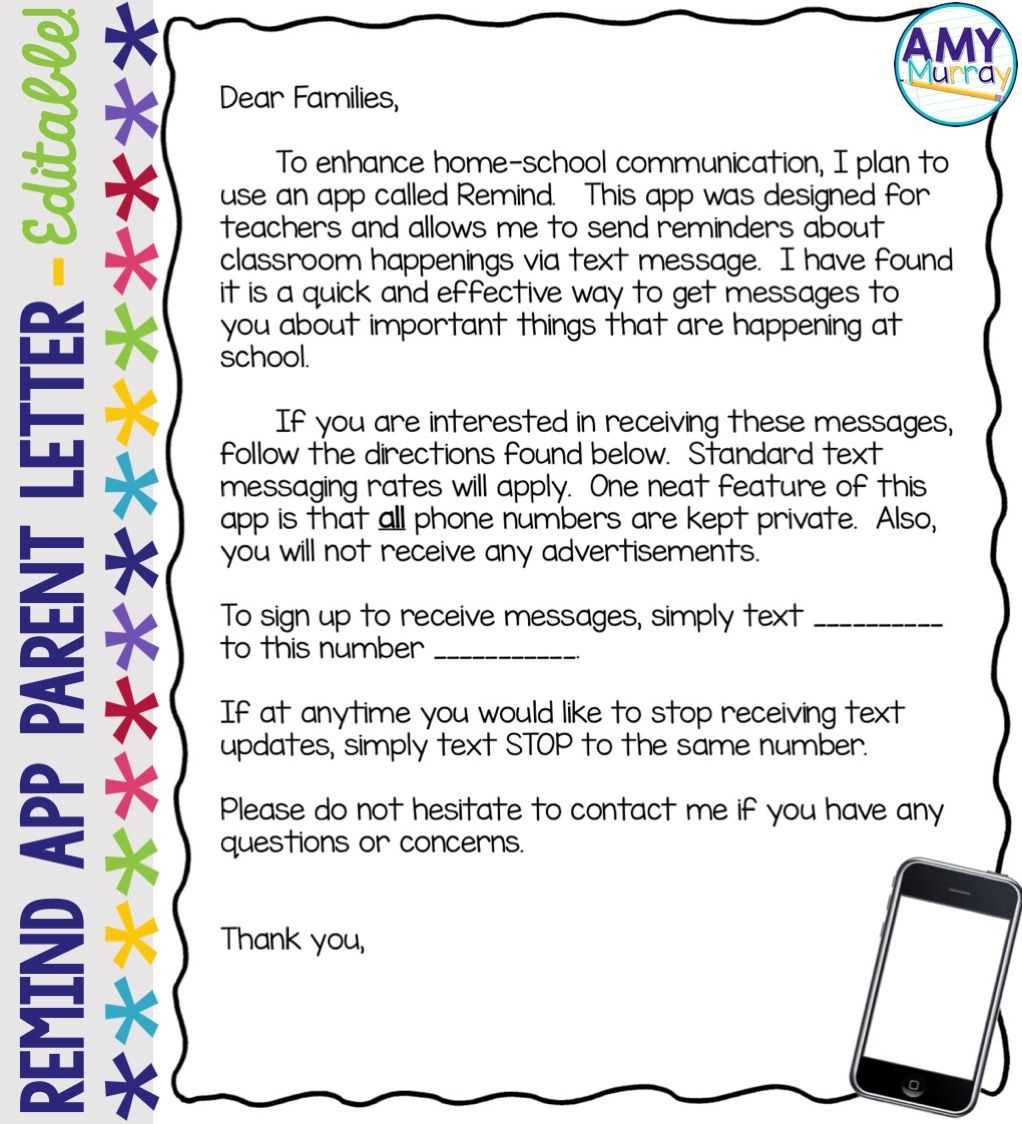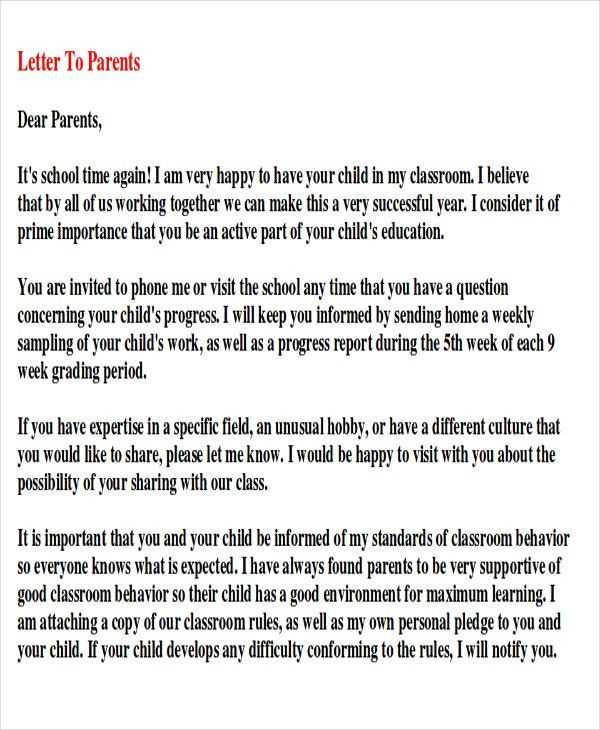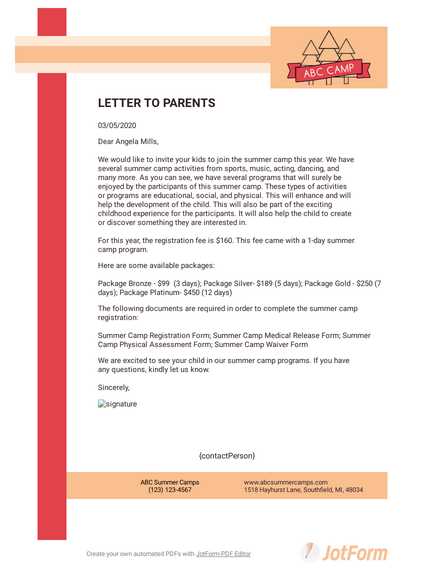Letter home to parents template

Writing a letter to your parents can be a meaningful way to stay connected and share experiences. Whether you are away at school, traveling, or living abroad, having a template can help streamline the process. You don’t have to worry about finding the right words every time. A simple structure will guide you in crafting a thoughtful and personal letter.
Start with a personal greeting that reflects your relationship with your parents. It could be as formal or as casual as you like, depending on your usual communication style. Then, give them an update on what’s happening in your life. This could include school activities, work, or new experiences. Share specific details so they can picture your day-to-day life.
Make sure to include a few lines about your well-being. Parents want to know how you’re doing emotionally and physically. Even a simple “I’m doing well” can reassure them. End the letter with a positive note, whether it’s expressing gratitude or sharing something you’re looking forward to. Don’t forget to sign off in a way that feels natural, whether it’s “Love,” “Take care,” or simply your name.
Letter Home to Parents Template
A letter home to parents provides an opportunity to share updates about a child’s well-being, progress, and any upcoming events. Keep the tone warm and informative, while addressing key points clearly. Here’s a simple template you can adapt for your needs:
Header
Include the date at the top, as well as the name of the student, school, and grade. This helps parents easily track the letter.
Introduction
Start with a friendly greeting. Mention the purpose of the letter, whether it’s to share news, report on academic progress, or update on social experiences. For example:
“Dear Parents,
“I hope this letter finds you well. I wanted to share some exciting updates about [Child’s Name]’s recent activities and progress here at [School Name].”
Body
Provide specific details about the child’s school life. This can include achievements, challenges, or noteworthy behavior.
- Academics: Mention any recent grades, projects, or skills learned.
- Social Life: Share insights into how the child is interacting with peers.
- Upcoming Events: Include any events the child is involved in, such as school plays, sports events, or field trips.
Conclusion
End the letter on a positive note. Reassure parents that their child is doing well and that you’re available for any follow-up.
“I look forward to seeing how [Child’s Name] continues to grow this semester. Please don’t hesitate to reach out if you have any questions or concerns. I’m always happy to chat!”
Sign-Off
Use a friendly closing statement, followed by your name or signature.
Sincerely,
[Your Name]
[Your Position]
Choosing the Right Tone for Your Letter
Adjust the tone of your letter based on the message you want to convey and your relationship with the recipients. A well-chosen tone can make the difference between a letter that connects and one that feels distant.
1. Be Warm and Friendly
When writing to your parents, aim for a tone that feels personal and approachable. Use language that reflects your closeness, making the reader feel involved in your life. Share your experiences openly, but keep it genuine and relatable. This helps create a sense of connection, even when you’re writing about everyday matters.
2. Keep It Honest and Positive
While it’s tempting to only mention the good things, it’s equally important to be truthful. Avoid sounding overly formal or distant. Parents appreciate hearing about both challenges and successes. Be honest but also frame any challenges positively, showing how you’re learning and growing from them.
3. Avoid Being Overly Casual
Even though you want to sound friendly, keep the tone respectful. Overly casual language might be misunderstood. Stay conversational, but keep the language appropriate for the relationship. Balance is key.
4. Adjust for the Situation
- If you’re sharing good news: Be enthusiastic but avoid exaggeration. Your tone should reflect your happiness without sounding over the top.
- If you’re discussing a problem: Be sincere, but don’t dwell on negativity. Parents will appreciate hearing about how you’re handling it rather than focusing solely on the issue.
5. Be Yourself
Don’t force a tone that doesn’t feel natural. A letter that feels like it’s truly from you will be more meaningful to your parents. Whether you’re funny, thoughtful, or straightforward, your unique voice is what will make the letter stand out.
What to Include in the First Paragraph: Setting the Scene
The first paragraph of a letter home sets the tone for the entire message. It’s your chance to give a snapshot of your current situation. Focus on specific details that capture your environment. Mention where you are, the time of year, and any immediate events or activities. This helps your parents picture your surroundings and understand what you’re experiencing. Avoid vague statements, and instead include concrete observations that make the scene come alive.
For example, instead of saying “I’m doing well,” describe what you’re doing or what’s happening around you. “The sun is shining brightly this morning, and I just finished a bike ride through the park” is a more vivid way to start. This immediately paints a clear image in the reader’s mind and provides a sense of your daily life.
Also, try to give a sense of the atmosphere, whether it’s peaceful, busy, or exciting. Are there any sounds, smells, or sights that stand out? Little details like a bustling street, the smell of fresh bread from a nearby bakery, or the quiet of a small coffee shop all add depth to your scene.
By setting a clear, engaging scene in the first paragraph, you draw your reader in and make them feel connected to your experiences from the start.
| Element | Example |
|---|---|
| Location | “I’m staying in a small town by the beach.” |
| Time | “It’s a cool morning here, just past 9 AM.” |
| Activity | “I’ve just returned from a quick hike up the hill.” |
| Atmosphere | “The streets are quieter than usual, with only a few people walking their dogs.” |
How to Share Important Updates on School Life and Activities
Be clear and direct when sharing school updates. Start with the most significant event or achievement, such as an upcoming performance or an award your child received. This immediately grabs the reader’s attention.
Highlight Key Dates and Events
Provide exact dates for important events like parent-teacher meetings, school trips, or sports competitions. List these dates in chronological order, so parents can easily follow along and mark them on their calendars.
Describe Involvement and Progress
Let parents know how your child is engaging with school life. Mention specific activities they’ve participated in, such as a school play, a sports team, or a club. If relevant, include their achievements and how they’ve grown in particular areas. For instance, note improvements in academic performance, skills learned in extracurricular activities, or positive feedback from teachers.
Focus on sharing both challenges and successes. For example, if there’s a subject that your child is struggling with, let parents know how it’s being addressed in class and what support is being provided. Balanced updates help parents stay informed without feeling overwhelmed.
Addressing Challenges and Concerns in a Constructive Manner
Start by clearly outlining the issue without exaggeration. Stick to facts and avoid emotional language. For example, instead of saying “I’m overwhelmed by everything,” frame it as, “I’ve been struggling with time management due to multiple assignments stacking up.” This focuses on the specific challenge and opens up a conversation for solutions.
Next, suggest a possible solution or course of action. For instance, if balancing schoolwork with personal life is difficult, propose a study schedule or ask for advice on how to prioritize tasks. This shows initiative and a willingness to address the concern actively.
If the issue involves an emotional or personal challenge, it’s important to communicate it without blame. Phrases like “I’ve noticed feeling anxious lately, and I’m working on strategies to manage it” indicate self-awareness and responsibility without creating tension.
Also, acknowledge the support system you need. Asking for guidance or expressing gratitude for previous help reinforces positive communication and fosters teamwork between you and your parents.
Lastly, end with a statement of optimism or a reaffirmation of your commitment to improve. This can help alleviate any concerns and reinforce that you’re taking proactive steps toward addressing the challenge.
Expressing Gratitude and Appreciation for Parental Support

Start your letter by directly acknowledging your parents’ efforts and the impact their support has on your life. Make sure to mention specific examples of their help, whether it’s emotional, financial, or guidance during difficult moments. Expressing appreciation with specifics makes your gratitude feel genuine and heartfelt.
Highlight Specific Acts of Support
For example, if your parents provided emotional support during a stressful time, describe how their encouragement helped you persevere. If they supported you financially, explain how their help eased burdens and allowed you to focus on important goals.
- “Your advice during my exams gave me the clarity I needed to stay focused.”
- “The financial assistance you provided during my internship helped me gain valuable experience without worrying about expenses.”
Recognize Their Ongoing Presence

It’s important to mention their continuous involvement in your life. Let them know that their support is always felt, whether it’s through regular check-ins or just knowing they’re there when needed. Even small acts of kindness can have a big impact on your well-being.
- “I really appreciate how you always make time to listen, even on your busiest days.”
- “The care packages you send remind me that I’m never far from home.”
End your message by reinforcing how much their support means to you. This can be a simple statement that reiterates your gratitude and emphasizes the positive effects of their actions on your life.
- “Thank you for always having my back. Your support makes all the difference in my life.”
- “I feel so lucky to have parents like you who are always there for me.”
Ending the Letter with Clear Actions or Requests for Parents
Close your letter by clearly outlining any actions or requests you would like parents to take. Be direct and precise, offering them a sense of purpose in responding. For example, if you need them to review a form or sign something, state it explicitly: “Please review the attached document and sign it by Friday.” This helps parents understand exactly what is needed from them.
If you require a specific action, such as setting up a meeting, make it clear when and how they should respond: “Can you confirm a time for our meeting next week by Wednesday?”
In case of a more general request, such as seeking support or feedback, offer a clear method for them to follow: “Let me know if you have any concerns by replying to this email or calling me.”
Ensure to add a polite, yet friendly tone, so your requests are not perceived as demanding. This will encourage a prompt and positive response.